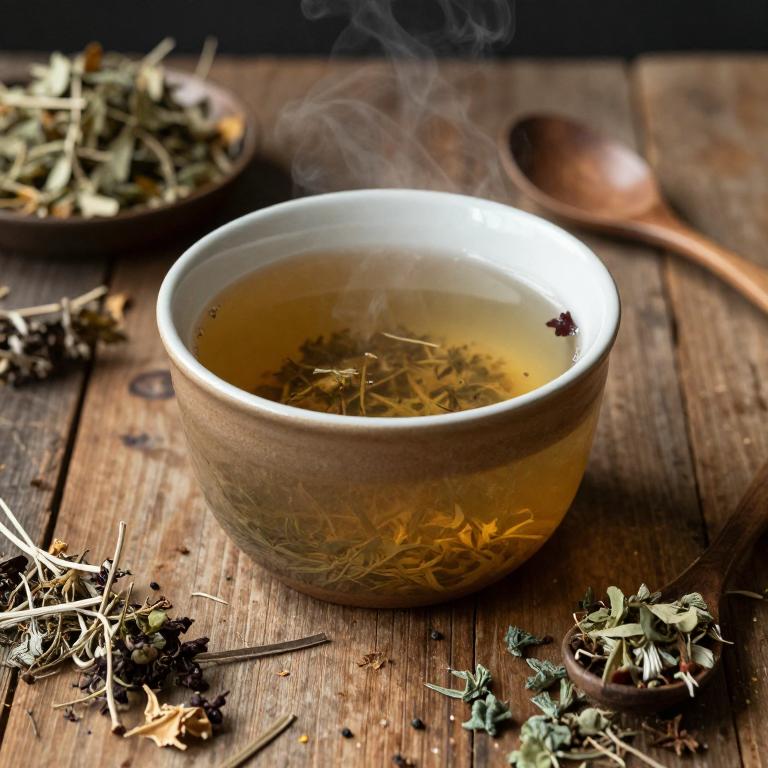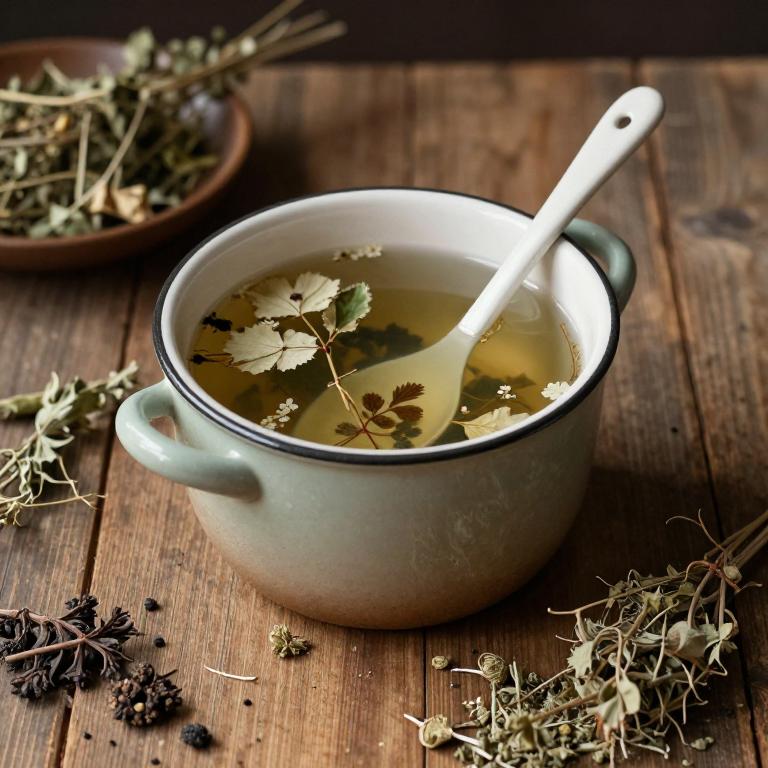10 Best Herbal Decoctions For Nasal Congestion

Herbal decoctions have long been used in traditional medicine to alleviate nasal congestion by promoting mucus drainage and reducing inflammation.
Common herbs such as eucalyptus, ginger, and garlic are often included in these decoctions for their decongestant and antiseptic properties. To prepare a decoction, the herbs are typically boiled in water for several minutes, then strained and consumed as a warm beverage. This practice is believed to help soothe the respiratory tract and ease breathing.
While generally safe, it is advisable to consult a healthcare professional before using herbal decoctions, especially for prolonged periods or in combination with other medications.
Table of Contents
- 1. Eucalyptus (Eucalyptus globulus)
- 2. Ginger (Zingiber officinale)
- 3. Peppermint (Mentha piperita)
- 4. Thyme (Thymus vulgaris)
- 5. Black pepper (Piper nigrum)
- 6. Salvia (Salvia officinalis)
- 7. Ceylon cinnamon (Cinnamomum verum)
- 8. Fennel (Foeniculum vulgare)
- 9. Catnip (Nepeta cataria)
- 10. Rosemary (Rosmarinus officinalis)
1. Eucalyptus (Eucalyptus globulus)

Eucalyptus globulus, commonly known as the Australian eucalyptus, is often used in herbal decoctions to alleviate symptoms of nasal congestion.
The primary active compound in eucalyptus oil, cineole, possesses anti-inflammatory and decongestant properties that help reduce mucus production and ease breathing. To prepare a decoction, the leaves of the plant are typically boiled in water for several minutes, allowing the essential oils to infuse into the liquid. This herbal remedy is particularly popular for its natural, soothing effects on the respiratory system.
However, it is important to use eucalyptus globulus cautiously, as excessive consumption may lead to gastrointestinal irritation or other adverse effects.
2. Ginger (Zingiber officinale)

Zingiber officinale, commonly known as ginger, has been traditionally used in herbal medicine for its potential to alleviate nasal congestion.
The active compounds in ginger, such as gingerol and shogaol, possess anti-inflammatory and decongestant properties that may help reduce swelling in the nasal passages. Preparing a ginger herbal decoction involves simmering fresh or dried ginger root in water to extract its beneficial compounds. This decoction can be consumed orally or used as a nasal rinse to soothe irritated tissues and improve airflow.
While ginger is generally safe, individuals with certain health conditions or those taking medications should consult a healthcare provider before using it as a treatment for nasal congestion.
3. Peppermint (Mentha piperita)

Mentha piperita, commonly known as peppermint, has been traditionally used in herbal medicine for its decongestant properties.
Peppermint herbal decoctions are prepared by steeping dried leaves in hot water, creating a soothing and aromatic infusion. The active compounds, such as menthol and eucalyptol, help to reduce inflammation and loosen mucus in the nasal passages. These decoctions are often used as a natural remedy for mild nasal congestion and sinus pressure.
However, it is important to consult a healthcare professional before using peppermint decoctions, especially for individuals with asthma or gastrointestinal sensitivities.
4. Thyme (Thymus vulgaris)

Thymus vulgaris, commonly known as thyme, has been traditionally used in herbal medicine for its potent anti-inflammatory and antimicrobial properties.
A thyme herbal decoction can be prepared by simmering fresh or dried thyme leaves in water, allowing the active compounds such as thymol and carvacrol to infuse into the liquid. This decoction may help alleviate nasal congestion by reducing inflammation in the nasal passages and thinning mucus, making it easier to expel. Some studies suggest that thyme may also support immune function, which can be beneficial during colds or respiratory infections.
However, it is important to consult a healthcare professional before using thyme decoctions, especially for individuals with allergies or those taking medications.
5. Black pepper (Piper nigrum)

Piper nigrum, commonly known as black pepper, has been traditionally used in herbal medicine for its potential to alleviate nasal congestion.
The active compound, piperine, is believed to possess anti-inflammatory and decongestant properties that may help reduce mucus production and improve nasal airflow. Herbal decoctions made from black pepper are often combined with other warming herbs like ginger or turmeric to enhance their effectiveness. These decoctions are typically prepared by boiling the dried peppercorns in water and drinking the resulting infusion.
While some anecdotal evidence supports their use, more scientific research is needed to fully understand their efficacy and safety for treating nasal congestion.
6. Salvia (Salvia officinalis)

Salvia officinalis, commonly known as sage, has been traditionally used in herbal medicine for its potential benefits in relieving nasal congestion.
A decoction made from the leaves of this plant can be prepared by simmering them in water, allowing the active compounds to be extracted. This herbal remedy is believed to possess anti-inflammatory and antimicrobial properties that may help reduce mucus production and soothe irritated nasal passages. Some studies suggest that sage may help alleviate symptoms of the common cold and sinusitis when used as a nasal rinse or steam inhalation.
However, it is important to consult with a healthcare professional before using sage decoctions, especially for prolonged periods or in combination with other medications.
7. Ceylon cinnamon (Cinnamomum verum)

Cinnamomum verum, commonly known as true cinnamon, has been traditionally used in herbal medicine for its warming and decongestant properties.
When prepared as a herbal decoction, it involves simmering the bark in water to extract its essential oils and active compounds. This decoction is believed to help alleviate nasal congestion by promoting mucus drainage and reducing inflammation in the nasal passages. The aromatic compounds in cinnamon, such as cinnamaldehyde, may also stimulate nasal breathing and improve airway clearance.
However, it is important to use cinnamon decoctions in moderation, as excessive consumption may cause irritation or interact with certain medications.
8. Fennel (Foeniculum vulgare)

Foeniculum vulgare, commonly known as fennel, has been traditionally used in herbal medicine for its potential to alleviate nasal congestion.
A decoction of fennel seeds is often prepared by simmering the dried seeds in water for several minutes, allowing the essential oils and active compounds to infuse into the liquid. This herbal remedy is believed to work by acting as a natural decongestant, helping to reduce inflammation and thin mucus in the nasal passages. The active components, such as anethol and fenchone, are thought to possess mild antispasmodic and bronchodilatory properties that may ease breathing.
While fennel decoctions are generally considered safe when used in moderation, individuals with allergies or certain medical conditions should consult a healthcare provider before use.
9. Catnip (Nepeta cataria)

Nepeta cataria, commonly known as catnip, has been traditionally used in herbal medicine for its potential respiratory benefits, including relief from nasal congestion.
A herbal decoction made from dried nepeta cataria leaves can be prepared by simmering the plant material in water to extract its aromatic compounds. The active components, such as nepetalactone and other volatile oils, may help to loosen mucus and reduce inflammation in the nasal passages. This natural remedy is often used as a complementary therapy for mild to moderate nasal congestion, particularly in colds or allergies.
However, it is advisable to consult a healthcare professional before using nepeta cataria, especially for individuals with known allergies or chronic respiratory conditions.
10. Rosemary (Rosmarinus officinalis)

Rosmarinus officinalis, commonly known as rosemary, has been traditionally used in herbal decoctions to alleviate nasal congestion due to its aromatic and anti-inflammatory properties.
When prepared as a decoction, rosemary leaves are simmered in water to extract their essential oils and active compounds, such as cineole and camphor, which have decongestant effects. This herbal remedy is often used in steam inhalation or as a nasal spray to help clear nasal passages and reduce sinus pressure. The warming and stimulating properties of rosemary decoctions can also help improve circulation and ease breathing in individuals suffering from colds or allergic rhinitis.
However, it is important to use rosemary with caution, as it may cause irritation in some individuals and should be avoided during pregnancy or by those with certain medical conditions.